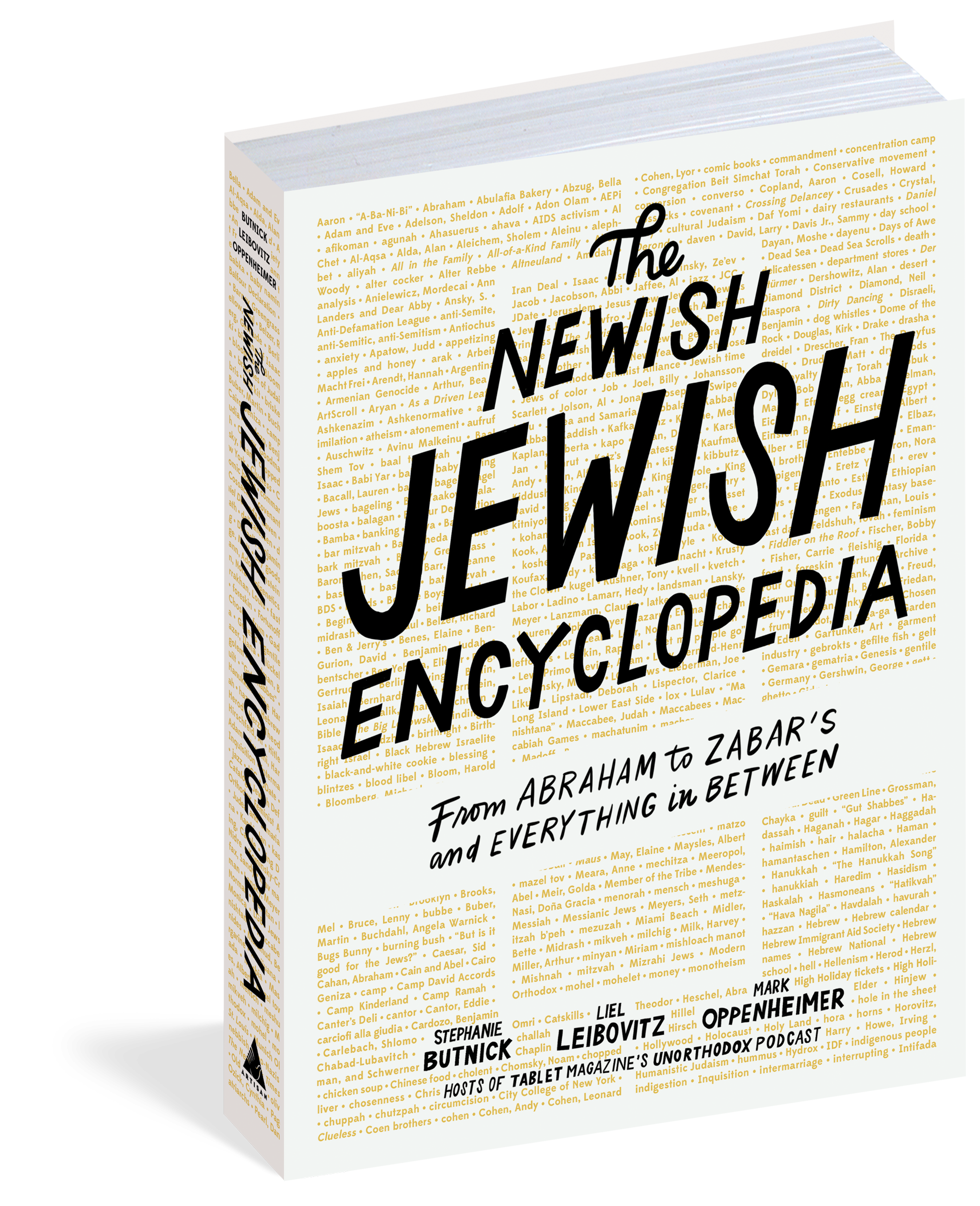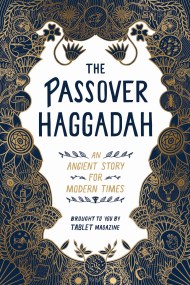By clicking “Accept,” you agree to the use of cookies and similar technologies on your device as set forth in our Cookie Policy and our Privacy Policy. Please note that certain cookies are essential for this website to function properly and do not require user consent to be deployed.
The Newish Jewish Encyclopedia
From Abraham to Zabar’s and Everything in Between
Contributors
By Tablet
Formats and Prices
- On Sale
- Oct 1, 2019
- Page Count
- 320 pages
- Publisher
- Artisan
- ISBN-13
- 9781579658939
Price
$40.00Price
$50.00 CADFormat
Format:
- Hardcover $40.00 $50.00 CAD
- ebook $16.99 $21.99 CAD
This item is a preorder. Your payment method will be charged immediately, and the product is expected to ship on or around October 1, 2019. This date is subject to change due to shipping delays beyond our control.
Buy from Other Retailers:
Named one of Library Journal’s Best Religion & Spirituality Books of the Year
An Unorthodox Guide to Everything Jewish
Deeply knowing, highly entertaining, and just a little bit irreverent, this unputdownable encyclopedia of all things Jewish and Jew-ish covers culture, religion, history, habits, language, and more. Readers will refresh their knowledge of the Patriarchs and Matriarchs, the artistry of Barbra Streisand, the significance of the Oslo Accords, the meaning of words like balaboosta,balagan, bashert, and bageling. Understand all the major and minor holidays. Learn how the Jews invented Hollywood. Remind themselves why they need to read Hannah Arendt, watch Seinfeld, listen to Leonard Cohen. Even discover the secret of happiness (see “Latkes”). Includes hundreds of photos, charts, infographics, and illustrations. It’s a lot.
An Unorthodox Guide to Everything Jewish
Deeply knowing, highly entertaining, and just a little bit irreverent, this unputdownable encyclopedia of all things Jewish and Jew-ish covers culture, religion, history, habits, language, and more. Readers will refresh their knowledge of the Patriarchs and Matriarchs, the artistry of Barbra Streisand, the significance of the Oslo Accords, the meaning of words like balaboosta,balagan, bashert, and bageling. Understand all the major and minor holidays. Learn how the Jews invented Hollywood. Remind themselves why they need to read Hannah Arendt, watch Seinfeld, listen to Leonard Cohen. Even discover the secret of happiness (see “Latkes”). Includes hundreds of photos, charts, infographics, and illustrations. It’s a lot.
Genre:
-
“An illustrated, smart and comic guide, well-attuned to this moment.”Booklist
I>Jewish Week
“Crams in just about everything you need to know about Jewish culture and history – from the Torah to Chinese food. . . . A weighty tome that just begs to be picked up, thumbed through, and quoted from. It is exhaustive but not exhausting, a thorough examination of Jewish themes presented as hors d’oeuvres to entice a larger meal.”
I>The Times of Israel
“Deeply entertaining and highly educational. . . . Adding their thoroughly modern compendium to a long tradition of Jewish scholarship, the authors have served up a colorful array of all things Jewish for Jews and non-Jews alike.”
I>Broadway World
“Alternately irreverent and profound—but always informative. . . . A great gift.”
I>BookPage
“This delightfully irreverent romp through Jewish history and culture is the outgrowth of Tablet magazine’s podcast, Unorthodox, and considers itself the updated version of The Jewish Catalog (1973). As with Catalog, podcast hosts and coauthors Butnick, Liel Leibovitz, and Mark Oppenheimer claim this chronicle is not a comprehensive or exhaustive survey of all things Jewish. To that end, the biblical hero Judah Maccabee is “one kickass priest,” Jewish Community Centers are places “where Gentiles play racquetball,” and Long Island is “the other Promised Land.” Culturally, the authors make a convincing argument for Jews as “mediators of black music” and even responsible for the beloved Christmas tunes “White Christmas” and “Rudolph the Red-Nosed Reindeer.” Bernie Madoff finds reference only under the generic moniker, shonde, or one who brings shame to the community, where he keeps company with Eliot Spitzer and Anthony Weiner. On a more serious note in a compilation filled with humor, brevity is the signature mark of that which requires mention, but not glory—Adolf Hitler, Nazis, and Auschwitz’s Arbeit Macht Frei (“work sets you free”) merit a single sentence each. VERDICT A welcome update on Jewish history and culture that is mostly just plain fun.
I>Library Journal, starred review
“No dense, scholarly tome, this volume is pure fun, although serious topics are included. . . . . A reference work is rarely as readable as this one is. Informative and irreverent, welcoming and witty, it is enthusiastically recommended.”
Newsletter Signup
By clicking ‘Sign Up,’ I acknowledge that I have read and agree to Hachette Book Group’s Privacy Policy and Terms of Use





















